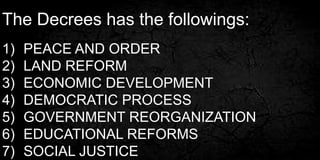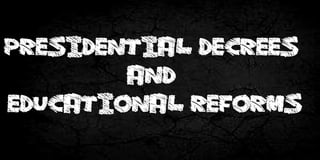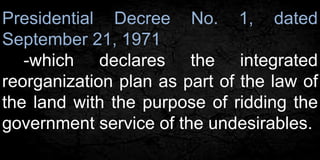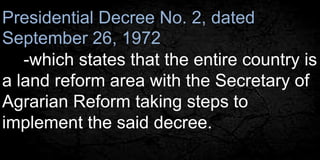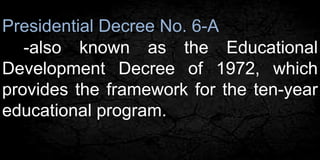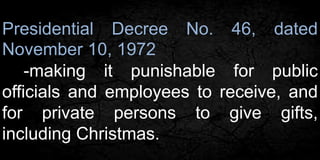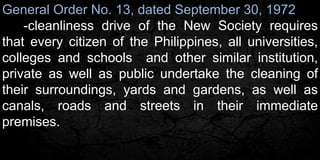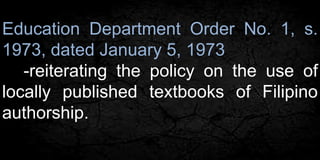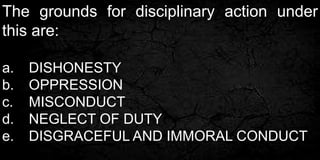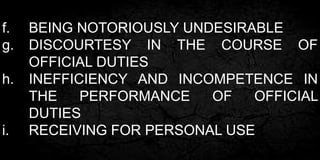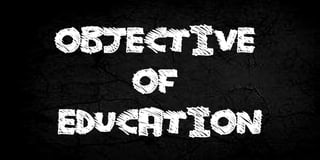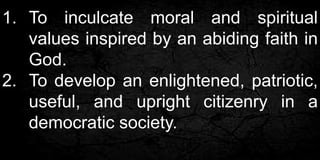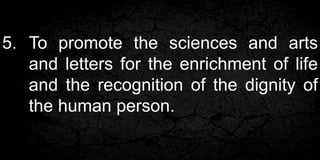National principles
- 2. The Decrees has the followings: 1) PEACE AND ORDER 2) LAND REFORM 3) ECONOMIC DEVELOPMENT 4) DEMOCRATIC PROCESS 5) GOVERNMENT REORGANIZATION 6) EDUCATIONAL REFORMS 7) SOCIAL JUSTICE
- 3. PRESIDENTIAL DECREES AND EDUCATIONAL REFORMS
- 4. Presidential Decree No. 1, dated September 21, 1971 -which declares the integrated reorganization plan as part of the law of the land with the purpose of ridding the government service of the undesirables.
- 5. Presidential Decree No. 2, dated September 26, 1972 -which states that the entire country is a land reform area with the Secretary of Agrarian Reform taking steps to implement the said decree.
- 6. Presidential Decree No. 6, dated October 6, 1972 -which outlines the amendatory rules on the administrative disciplines of government officials and employees.
- 7. Presidential Decree No. 6-A -also known as the Educational Development Decree of 1972, which provides the framework for the ten-year educational program.
- 8. Presidential Decree No. 27, dated October 21, 1972 -which guarantees the emancipation of tenants from the bondage of the soil by transferring to them the ownership of the land they till and providing them with the instruments and mechanics thereof.
- 9. Presidential Decree No. 46, dated November 10, 1972 -making it punishable for public officials and employees to receive, and for private persons to give gifts, including Christmas.
- 10. Presidential Decree No. 48, dated October 11, 1972 -establishing the Philippine Council for Agricultural Research now (PCARRD) to oversee, unify, integrate the planning, administration and implementation of the governmentâs agricultural research program, establish a system of priorities agriculture, forestry, fisheries research, etc.
- 11. Presidential Decree No. 10, dated September 1, 1973 -declaring unlawful rumor - mongering and spreading of false information.
- 12. Presidential Decree No. 146, dated March 9, 1973 -which requires all high school graduates seeking admission to at least a four-year college course to pass a national college entrance exam.
- 13. Presidential Decree No. 1153 -institutionalizing the reforestation of the country side specially the watershed areas and all schools and universities to participate actively in the annual tree planting activity.
- 14. General Order No. 13, dated September 30, 1972 -cleanliness drive of the New Society requires that every citizen of the Philippines, all universities, colleges and schools and other similar institution, private as well as public undertake the cleaning of their surroundings, yards and gardens, as well as canals, roads and streets in their immediate premises.
- 15. General Order No. 15, dated October 5, 1972 -prohibition; of ostentatious display of wealth and extravagance, calling upon every resident and citizen of the Philippines including all elective officials from provincial governors down to the barrio councilmen.
- 16. General Order No. 18, dated December 8, 1972 -enjoins all citizens, schools, etc, to promote the concept off family welfare, responsible parenthood, and family planning.
- 17. Letter of Instruction No. 2, dated September 2, 1972 - bans certain motion pictures in order to safeguard the morality of the society specially the youth against the negative influence of certain motion pictures.
- 18. Letter of Instruction No. 51, dated January 13, 1973 -created a special task force to study the salary promotion scheme for public school teachers.
- 19. Education Department Order No. 1, s. 1973, dated January 5, 1973 -reiterating the policy on the use of locally published textbooks of Filipino authorship.
- 20. Education Department Order No. 28, s. 1972 -requiring school heads to take disciplinary action against teachers, employees and students.
- 21. Education Order No. 32, s. 1972 -limiting the academic freedom of teachers.
- 22. PRESIDENTIAL DECREE NO. 6
- 23. The grounds for disciplinary action under this are: a. DISHONESTY b. OPPRESSION c. MISCONDUCT d. NEGLECT OF DUTY e. DISGRACEFUL AND IMMORAL CONDUCT
- 24. f. BEING NOTORIOUSLY UNDESIRABLE g. DISCOURTESY IN THE COURSE OF OFFICIAL DUTIES h. INEFFICIENCY AND INCOMPETENCE IN THE PERFORMANCE OF OFFICIAL DUTIES i. RECEIVING FOR PERSONAL USE
- 26. 1. To inculcate moral and spiritual values inspired by an abiding faith in God. 2. To develop an enlightened, patriotic, useful, and upright citizenry in a democratic society.
- 27. 3. To instill habits of industry and thrift and to prepare individuals for the economic development and wise conservation of nationâs natural resources. 4. To maintain family solidarity, to improve community life, to perpetuate all that is desirable in our national heritage, and to serve the cause of world peace.
- 28. 5. To promote the sciences and arts and letters for the enrichment of life and the recognition of the dignity of the human person.


